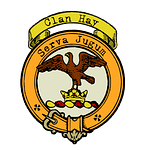Welcome back to A Clan A Day Podcast, brought to you by bagtownclans.com. I’m your host, Colin MacDonald, and today we’re journeying to the Lowlands of Scotland to explore the fascinating history of Clan MacLellan. Known for their resilience, loyalty, and dramatic rises and falls, the MacLellans carved out a unique place in Scottish history that continues to intrigue.
The roots of Clan MacLellan trace back to Galloway in the southwest of Scotland. The clan’s name, derived from the Gaelic "Mac-a-ghille-dhiolan," translates to “son of the bastard,” referencing a connection to Thomas of Galloway, the illegitimate son of Alan, Lord of Galloway. This colorful origin story places the MacLellans at the heart of medieval power struggles.
During the 13th century, Cane McGillolane, a knight in service to John Balliol, emerged as a significant figure. As supporters of the Balliol claim to the Scottish throne, the MacLellans found themselves embroiled in the Wars of Scottish Independence. Despite backing the losing Balliol cause against Robert the Bruce, the MacLellans adapted and reintegrated into the Scottish Crown’s favor under David II.
The MacLellans rose to prominence in the 15th century, with no fewer than 14 knights bearing the family name in Galloway. However, their growing power brought them into conflict with the mighty Clan Douglas. One infamous episode involved Sir Patrick MacLellan, the Sheriff of Galloway, who clashed with William Douglas, the 8th Earl of Douglas. Refusing to join a conspiracy against King James II, Sir Patrick was captured and executed by Douglas despite royal orders for his release. This act ignited a vendetta that saw the MacLellans align themselves firmly with the Crown.
In a twist of poetic justice, Sir Patrick’s nephew, Sir Patrick Gray, later exacted revenge by participating in the assassination of Douglas in the presence of King James II. Legend holds that the MacLellans used the massive Scottish cannon Mons Meg to exact further vengeance, symbolized by the clan motto, Superba Frango (“I humble proud things”).
Another defining moment came when Sir William MacLellan captured the leader of a notorious band of thieves terrorizing Galloway. Presenting the leader’s head on his sword to King James II, Sir William earned a restoration of the clan’s forfeited lands. As a reminder to the King of his unfulfilled promise, MacLellan adopted the motto Think On, which remains the clan’s rallying cry.
The zenith of the clan’s influence came during the 16th century, when Sir Thomas MacLellan of Bombie constructed MacLellan’s Castle in Kirkcudbright. This grand Gothic mansion, built with stones repurposed from the ruins of a Franciscan friary, symbolized the family’s status and sophistication. Sir Thomas, a staunch supporter of Mary, Queen of Scots, secured the family’s prosperity under her son, King James VI.
The MacLellans’ fortunes began to wane during the tumultuous 17th century. Sir Robert MacLellan, the first Lord Kirkcudbright, supported the royalist cause in the Civil War, incurring significant debts that left the family estates ruined. His son, the third Lord Kirkcudbright, continued the clan’s tradition of loyalty, raising troops to support King Charles I. However, this commitment drained their resources, leaving the family impoverished.
By the 18th century, the MacLellan title and lands had fallen into disrepair. Anecdotes tell of later lords running an alehouse and greasing travelers’ boots to make ends meet. Despite this decline, the family maintained a sense of pride, with one lord famously providing gloves to his peers at parliamentary gatherings.
The last titled chief of Clan MacLellan, Camden Gray MacLellan, passed away in 1832, leaving the clan without a recognized leader. The title of Lord Kirkcudbright remains dormant, and the lands once held by the MacLellans have long since passed into other hands.
However, the legacy of Clan MacLellan endures in their contributions to Scottish history. Their crest, depicting a Moor’s head on the point of a sword, and their evocative mottos, Think On and Superba Frango, capture the indomitable spirit of a clan that thrived amid the shifting sands of Scotland’s turbulent history.
Today, Clan MacLellan is classified as an armigerous clan, meaning it has no chief. Yet the story of this resilient family continues to inspire pride among its descendants and interest among historians. The ivy-covered ruins of MacLellan’s Castle stand as a haunting reminder of the clan’s former glory—a testament to the ambitions, triumphs, and trials of this remarkable Scottish family.
Thank you for joining us on this journey through the history of Clan MacLellan. Be sure to tune in tomorrow for another episode of A Clan A Day Podcast. I’m Colin MacDonald, reminding you to Think On, and as always, Go n-éirí an bóthar leat.











